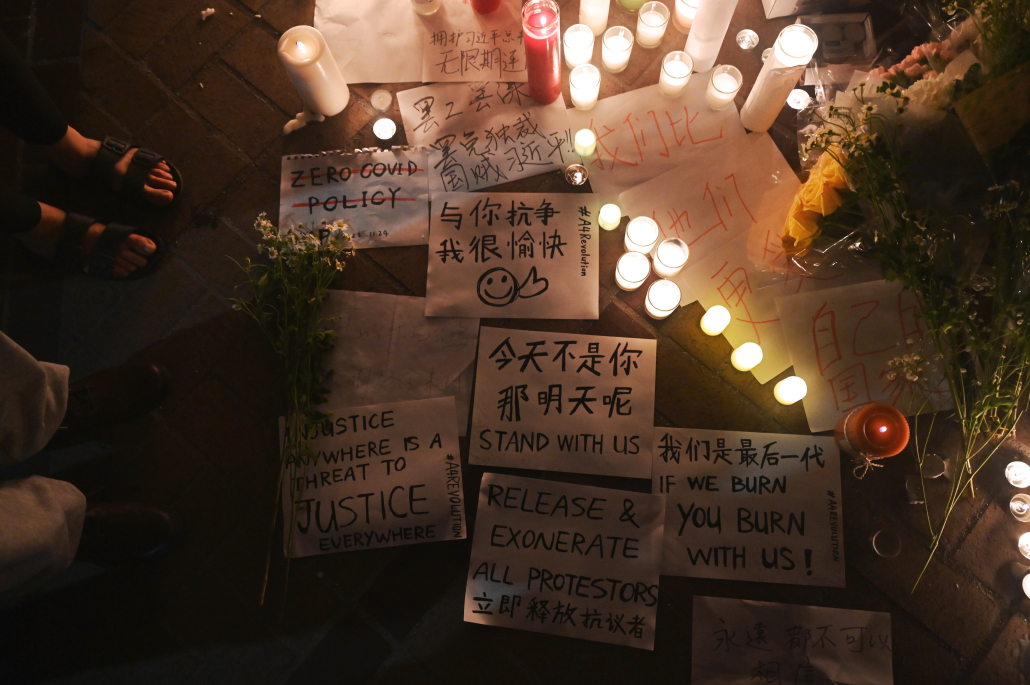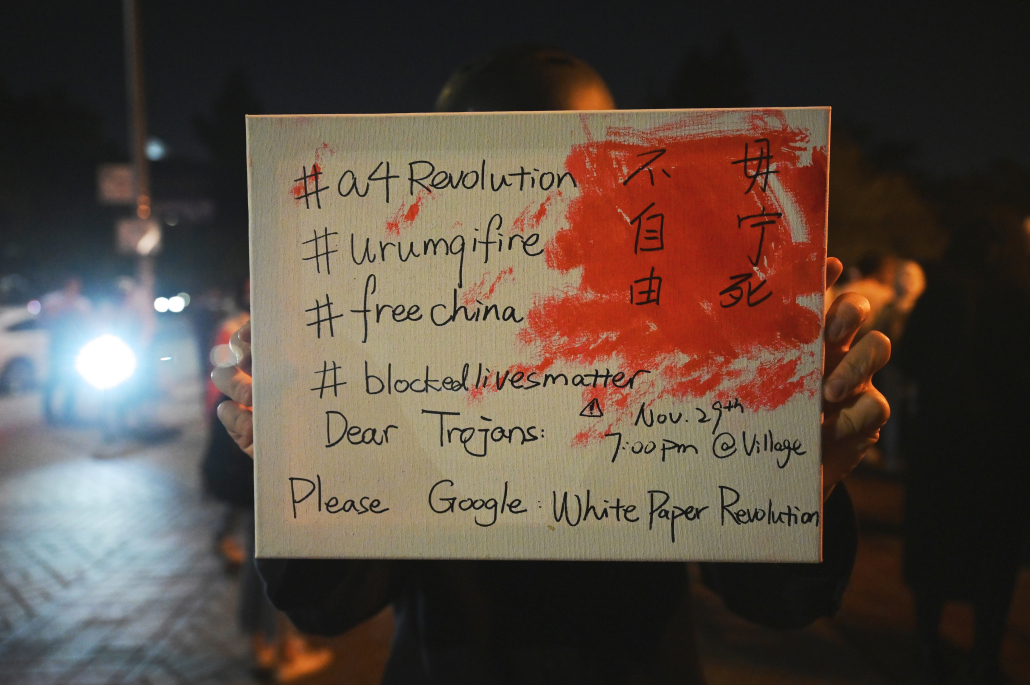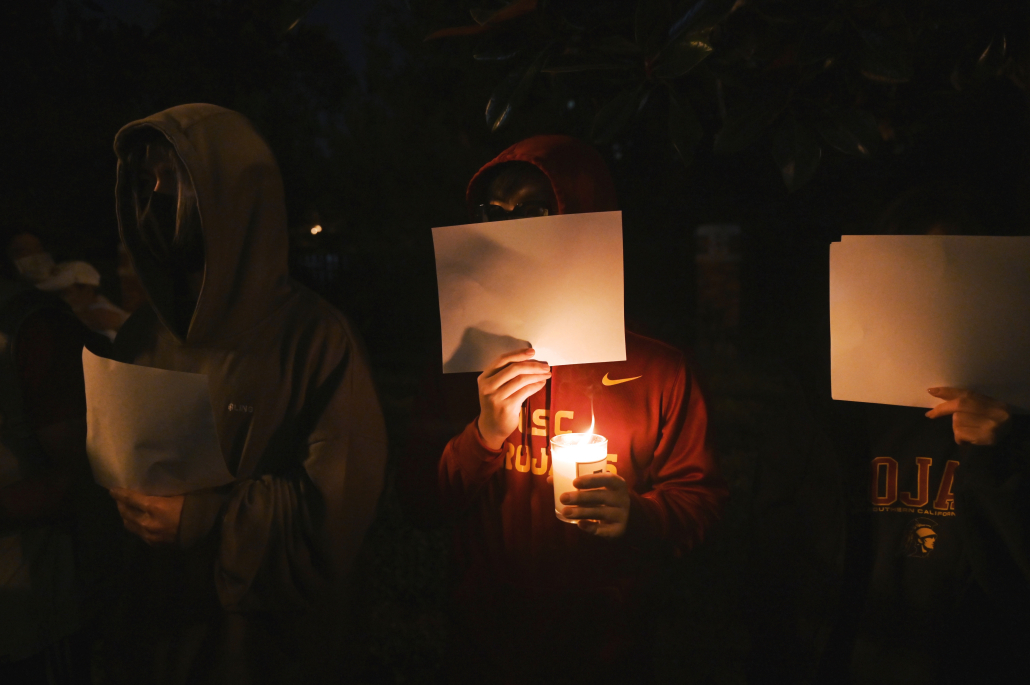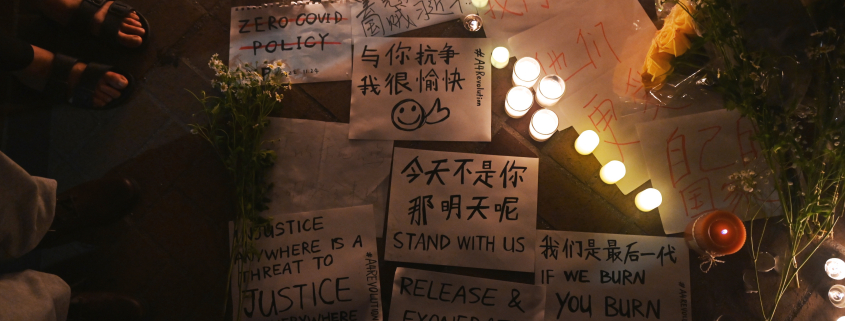‘My country betrayed me first’: USC students protest China’s zero-COVID policy

Chants alternating between the English and Mandarin of “free free China,” “liberty or death” and “no more Xi Jinping” echoed through campus Tuesday night as more than 100 students and community members gathered to remember and mourn victims of an apartment fire that occurred last Thursday and protest China’s zero-COVID policy.
The trigger for the movement came last week, when a fire ravaged a high-rise apartment building in Urumqi, China, killing 10. The city has been under lockdown for three months and locals allege that the zero-COVID policy contributed to unnecessary deaths.
The candlelight vigil, held at the entrance to campus on Jefferson Boulevard and Hoover Street, was run parallel to protests in cities across China. The zero-COVID policy, one of the world’s longest-lasting and strictest coronavirus response plans, enforces indefinite lockdowns on entire communities even if only a handful of cases are found. In some instances, workers have been locked in factories to continue working while under quarantine.


Emergency services were unable to come close enough to the building to stop the blaze due to cars abandoned in the streets, and though the media has been unable to confirm it, some allege that emergency exits may have been locked or welded shut to enforce the lockdown, trapping residents in the building.
The tragedy inspired Catherine Guo, a junior majoring in interactive media and game design, to attend the vigil.
“I feel responsible that the place I grew up, the place where my family is, [is] putting people I know and love through this inhumane treatment,” Guo said. “The next fire could wipe out my family.”
Vigils held across China this week to honor the victims quickly turned into protests and spread across the country in a matter of hours, becoming one of the largest protests in China’s history since Tiananmen Square in 1989. Photos of protestors holding blank white sheets of paper went viral worldwide in a protest against the Chinese government’s infamous censorship laws.
Like those held in China, the vigil for Urumqi victims in front of campus on Tuesday quickly became a protest of the Chinese government as a whole. Students and members of the Los Angeles community gathered in droves with signs and banners to give passionate speeches against the genocide of Uyghur Muslims in Xinjiang, the Chinese government’s crackdown in Hong Kong and government censorship.
Monica Wu, a graduate student studying film production, explained a list of demands of the Chinese government that she had taped to her jacket: to release illegally detailed protestors, investigate what she called unethical PCR testing, stop what many Chinese citizens see as unnecessary lockdowns, and formally apologize for the Urumqi fire.
Han Wang, a graduate student studying data analytics, was a primary organizer of the protest and said he was struck by the level of passion for justice despite China’s notorious crackdowns on protesters.
“It’s really meaningful,” Wang said when asked what it felt like to see so many USC students at the rally. “For so long, the Chinese students have been, to be honest, not that courageous. Today, they are so brave to just stand or to speak. I’m very happy about that.”
Like protesters in China, who are posting videos upside down to confuse censorship algorithms or hacking through China’s strict internet firewall to organize, the USC community found creative ways to mourn victims of the fire and voice their discontent while keeping international students safe.

Many attendees wore masks, sunglasses or other face coverings to conceal their identities. When Wang asked who in the crowd was attending their first protest that night, nearly every hand was raised.
This was Wu’s second protest, the first being the day prior at the Chinese consulate in L.A.
“[Many Chinese people] didn’t grow up in an environment that was safe to [protest in],” she said. “So this is all new to us, and I was very moved tonight.”
Guo recognized the difficulty of the situation and the feelings of helplessness that often accompany controversial issues in China such as censorship, but like Wang and Wu, found hope in how the community came together.
“The Chinese government has been really big on wiping out information,” she said. “So just to be [at this protest], just to remember that this happened, even if it does end up failing … I know we fought, and I think that’s important.”


